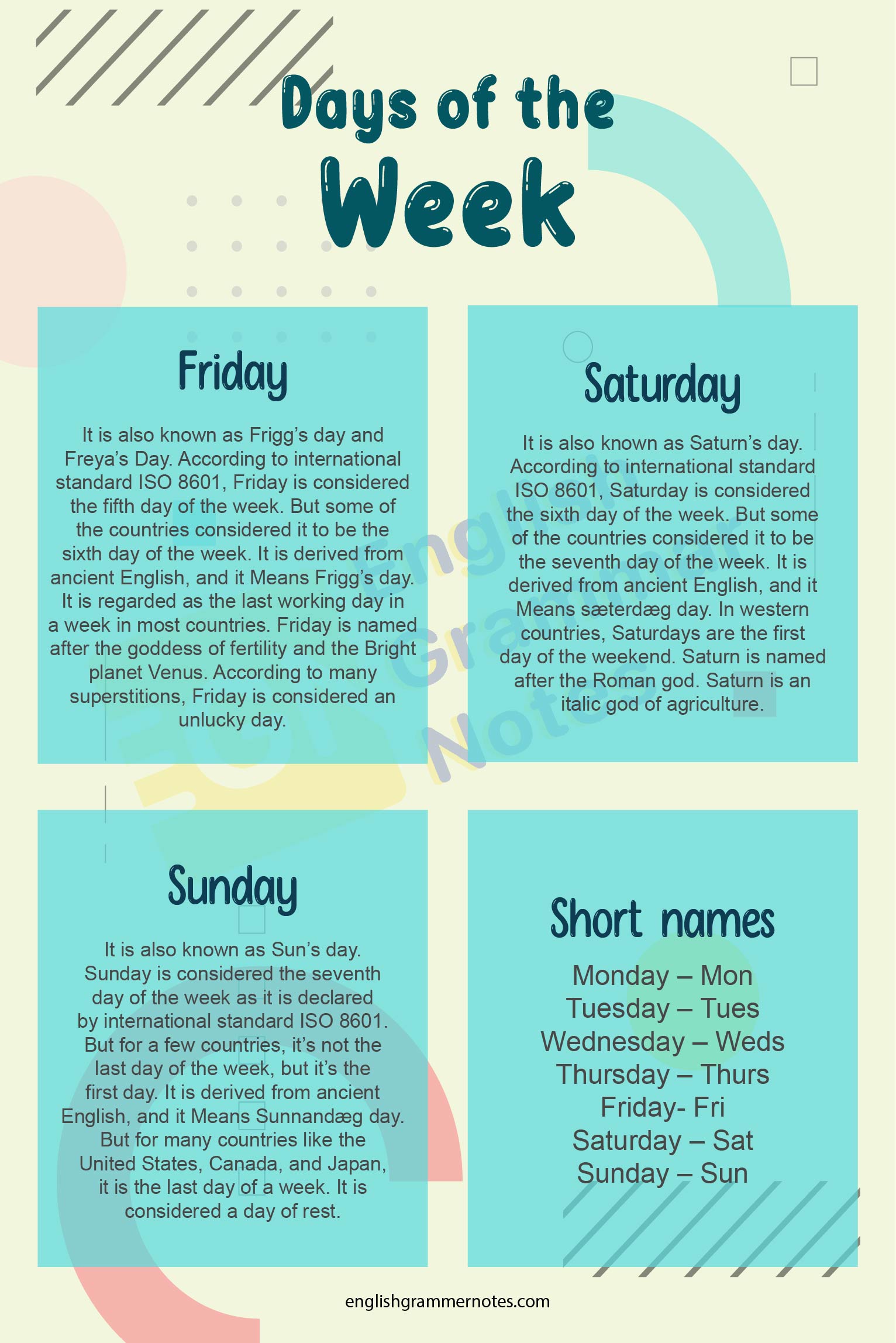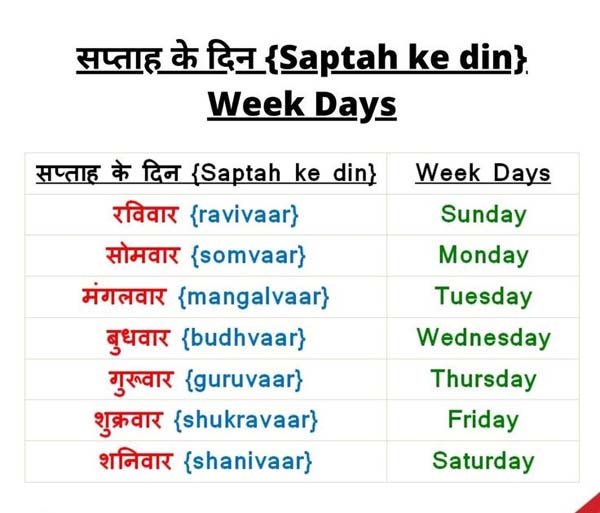Days of the Week: The seven names of days are derived from the name of gods. And the names are based on the Latin language, and it comes from the Romanian calendar in which they relate every day with different celestial bodies of our Solar system. And they are as follows:
- Sun
- Moon
- Mercury
- Venus
- Mars
- Jupiter
- Saturn
Languages like Hindi, Japanese, and Koreans follow the equivalent relation between the days of the week and planets.
Study the most important English Vocabulary Words identified by our experts and learn the right vocabulary to use in your day to day conversations.
Name The Days Of The Week
In one week, there are a total of 7 days. These days are named as follows:
- Monday
- Tuesday
- Wednesday
- Thursday
- Friday
- Saturday
- Sunday
Days of the week start from Monday or Sunday. If days begin from Monday, it ends on Sunday, and if it starts from Sunday, it ends on Saturday.
Most days of the week start from Monday as we follow international standard week (ISO 8601). Sunday is considered the starting day of the week and weekend in countries like the United States and Canada.

People Can Ask Why There Are Only Seven Days In A Week?
Babylonian astrologers in 700 BC allotted gods of planets to days of weeks, and after these, Romans changed those names by the Roman calendar. And later on, German people and Norse people followed the same pattern with some of the gods.
In different religions, there is one day which is a day of rest, prayer, and worship for them. Sunday is considered as the day of rest and worship, according to Christians. For Muslims, Friday is the day of prayers. Saturday is the day of worship and rests according to Jewish people.
Saturday and Sunday are both considered days of rest. In some of the countries, they use different colours for representing the weekends and working days.
A typical year has 52 weeks in which seven days and adds on 1 or 2 days. Some of the years have 53 weeks, and European and Asian countries follow a different pattern. But not that much used by the United States.
We can shorten the names of Days of the week as follows:
- Monday – Mon
- Tuesday – Tues
- Wednesday – Weds
- Thursday – Thurs
- Friday- Fri
- Saturday – Sat
- Sunday – Sun

Let’s discuss some knowledgeable and informative points regarding these days ;
Monday
Monday is the first day of the week, as declared by the international standard ISO 8601. It is considered the second day of the week in some countries like Canada, Japan, and the US.
Monday is the first day of the week and is derived from old English and the meaning of this first day is the Moon’s day. Many cultures and religions name Monday as the second day of the week, and they consider Sunday the first day of the week.
Let’s discuss some of the holidays on Monday. There are three bank holidays on Monday in the United Kingdom. Labor Day, Memorial Day, and Columbus Day are several holidays in the US that always fall on Monday. And also Easter Monday, which is also a holiday in the UK.
Previously Monday was known as Blue Monday because it was associated with washing clothes with blue dye. But now it is referred to as the day when workers return to their work after a weekend.
Many people hate Mondays because it is the starting day for work. However, Monday is considered a good day and a fasting day in Judaism and Islam. And that’s why people don’t like Monday.
Tuesday
It can be known as Mars day. As declared by the international standard ISO 8601, Tuesday is the second day of the week. While for some of the countries, Tuesday is considered the third day of the week.
It is derived from our ancient English. Tuesday is known as martes, Mardi, martedì in Spanish, French and Italian, respectively. Tuesday is considered an unlucky day in Greece and Spain. The fall of Constantinople occurred on Tuesday. That’s why Greece considered it an unlucky day. But for Judaism, Tuesday is a lucky day. Usually, the US elections are held on Tuesday, whether at the local, state, or country level. It is also known as Fat Tuesday according to the western Christian calendar.
Wednesday
According to the international standard ISO 8601, Wednesday is considered the third day of the week. But some of the countries considered it to be the fourth day of the week. It is also known as Odin and Wodan’s day. It is derived from ancient English, and it Means Wodan’s day. Wodan is a Germanic god. Odin is the Norse father of the gods. Odin is also known as Wodan.
This Wednesday is named after the gods and Mercury. It is the middle of a total of 5 working days starting from Monday and ending on Friday. Friday is also known as a jump day. Because countries like Canada and America consider Sunday as the first day of the week and Saturday as the last day of the week, and because of this, Wednesday lies in between these days. Wednesday is considered as a fast day throughout the year, according to the eastern orthodox Church.
Thursday
It’s also known as Thor’s day. Thursday is named after Thor. Thursday is considered the fourth day of the week as declared by the international standard ISO 8601. In a few countries, Thursday is known as the fifth day of the week. It is derived from ancient English, and it Means Thunder’s day.
Planet Jupiter is used for naming the fourth day of the week. Jupiter is the supreme god of the sky. It is known as if it is a thunder who’s continuously managing the power. Since 1935, all the UK elections have been held on Thursday. It is also known as sheer Thursday in the UK. Thanksgiving day is celebrated in November on the fourth Thursday. Most of the movies open on Thursday nights in Australia. Most Australians are paid weekly on Thursday, so most shopping malls are open until 9 pm.
Friday
It is also known as Frigg’s day and Freya’s Day. According to international standard ISO 8601, Friday is considered the fifth day of the week. But some of the countries considered it to be the sixth day of the week. It is derived from ancient English, and it Means Frigg’s day. It is regarded as the last working day in a week in most countries. Friday is named after the goddess of fertility and the Bright planet Venus.
According to many superstitions, Friday is considered an unlucky day. But for sowing seeds, Friday is the best and lucky day. For Muslims, Friday is a day of prayers, And in Muslims, it’s known as Jummah.
Goddesses like Durga, Parvati, etc., are special observances that are practised on Friday. In Australia and the UK, Poets day is also used for Friday as it is the last working day For workers in a week. “Piss Off Early Tomorrow’s Saturday” is full of poets in terms of these days of weeks.
Saturday
It is also known as Saturn’s day. According to international standard ISO 8601, Saturday is considered the sixth day of the week. But some of the countries considered it to be the seventh day of the week. It is derived from ancient English, and it Means sæterdæg day.
In western countries, Saturdays are the first day of the weekend. Saturn is named after the Roman god. Saturn is an italic god of agriculture. Saturday is the rest of the day in Israel, Nepal, in which mostly all the transportation and businesses are closed. Elections in New Zealand and Australia are normally on Saturdays.
Sunday
It is also known as Sun’s day. Sunday is considered the seventh day of the week as it is declared by international standard ISO 8601. But for a few countries, it’s not the last day of the week, but it’s the first day. It is derived from ancient English, and it Means Sunnandæg day. But for many countries like the United States, Canada, and Japan, it is the last day of a week. It is considered a day of rest.
Let’s know the names of days of weeks according to the Muslim calendar;
- yum al-Ahad (Sunday)
- yawm al-Thani (Monday)
- you at-thalatha (Tuesday)
- yum all area’s (Wednesday)
- yawm al- Khamis (Thursday)
- yum al-Jumu’ah (Friday)
- yum as-sabt (Saturday)
Let’s know the names of days of weeks according to the Hindu calendar;
- Raviãra: Sunday (day of Sun)
- Somavãra: Monday (day of Moon)
- Mañgalvã: Tuesday (day of Mars)
- Budhavãra: Wednesday (day of Mercury)
- Guruvãra: Thursday (day of Jupiter)
- Sukravãra: Friday (day of Venus)
- Sanivãra: Saturday (day of Saturn)
Well, every time, it’s not necessary that we represent a day by name only. We can use Yesterday, Today, and Tomorrow too in place of these days’ names.
- Yesterday: the day before the Present day.
- Today: the present day
- Tomorrow: the day after the present day.

